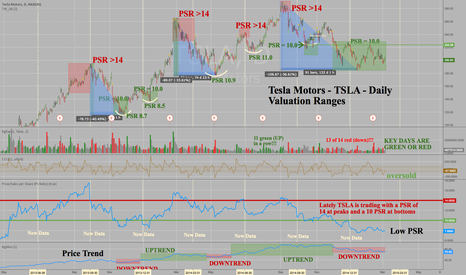Tesla s Valuation Continues To Defy Logic Tesla Motors (NASDAQ TSLA)
Post on: 21 Июль, 2015 No Comment

Throughout the history of investing in stocks, a great divide has always existed between the balance sheet (book value) and income statement (net income). A company with a low book value can obtain a significant market value due to high expectations of future earnings. Conversely, a company with a high book value and limited earnings potential will usually obtain a low market valuation. While the latter is typically a low risk stock backed by assets, it can’t usually be given away to market participants at any valuation. On the flip side, the opposite stock can reach extreme valuations even with no fundamentally reason to back up the sky-high price.
Tesla Motors (NASDAQ:TSLA ) fits into an extreme version of the prior scenario of limited book value and perceived high earnings potential leading to a sky-high valuation. Whenever any investor thinks about the potential of the elective vehicle category and whether battery advancements can improve the performance, distance and more importantly price, one can’t argue that a large void exists between where Tesla’s stock sits and where it will land in the occasion of a disappointing event.
Questions On Performance
A real debate exists between numerous media outlets, analysts and even contributors on Seeking Alpha. The promise of a cleaner and more environmentally friendly source always pulls in the bulls. The bears question whether electricity is that clean when sourced from a coal-based electric grid and the use of environmentally unfriendly batteries.
Lately, CNBC regularly reports on the three Tesla vehicles to catch fire and fellow SA contributor John Petersen has written numerous articles regarding battery limitations and questionable accounting. While analysts such as Deutsche Bank’s Dan Galves placed a $200 price target on the stock based on strong order flows from China, improved gross margins and leverage, and a resolution on fires.
The debate is fierce and interesting, but ultimately it should take place at a more balanced stock price.
Comparative Valuations
Going back to determining value based on a combination of assets and the earnings potential of those assets, Tesla provides some scary numbers for current bulls. For a comparative valuation, both valuation metrics will be utilized to see if Tesla has any valuation versus the hottest stocks in the domestic markets. In this case, the valuations were compared to Facebook (NASDAQ:FB ). 3D Systems (NYSE:DDD ). Netflix (NASDAQ:NFLX ). Yelp (NYSE:YELP ). and Workday (NYSE:WDAY ). In essence, the hottest stocks in social media, 3D printing and cloud software, yet Tesla generates some off-the-chart numbers.
Over the last three years, the price-to-book value multiple has been extremely high. In reality, Tesla has limited book value and investors would obtain no value if an unexpected event were to hit the company. Compared to even the hottest social media and software stocks, Tesla flies off the chart. Compared to the other hot industrial stock in 3D Systems, one gets the impression that 3D Systems might need to be revisited as a potential value stock.
Naturally if the first valuation metric is unappealing, it must mean that the earnings growth rate is extremely attractive. Actually, this metric as well suggests Tesla should be the last stock in the group purchased. According to the table below, Tesla has the lowest long-term growth rate in the group. About the only thing going for the stock is the forward earnings multiple actually sits in the middle of the group. With the stock trading at 4x the growth rate, nobody would suggest the stock is close to a bargain.
Price to Earnings














